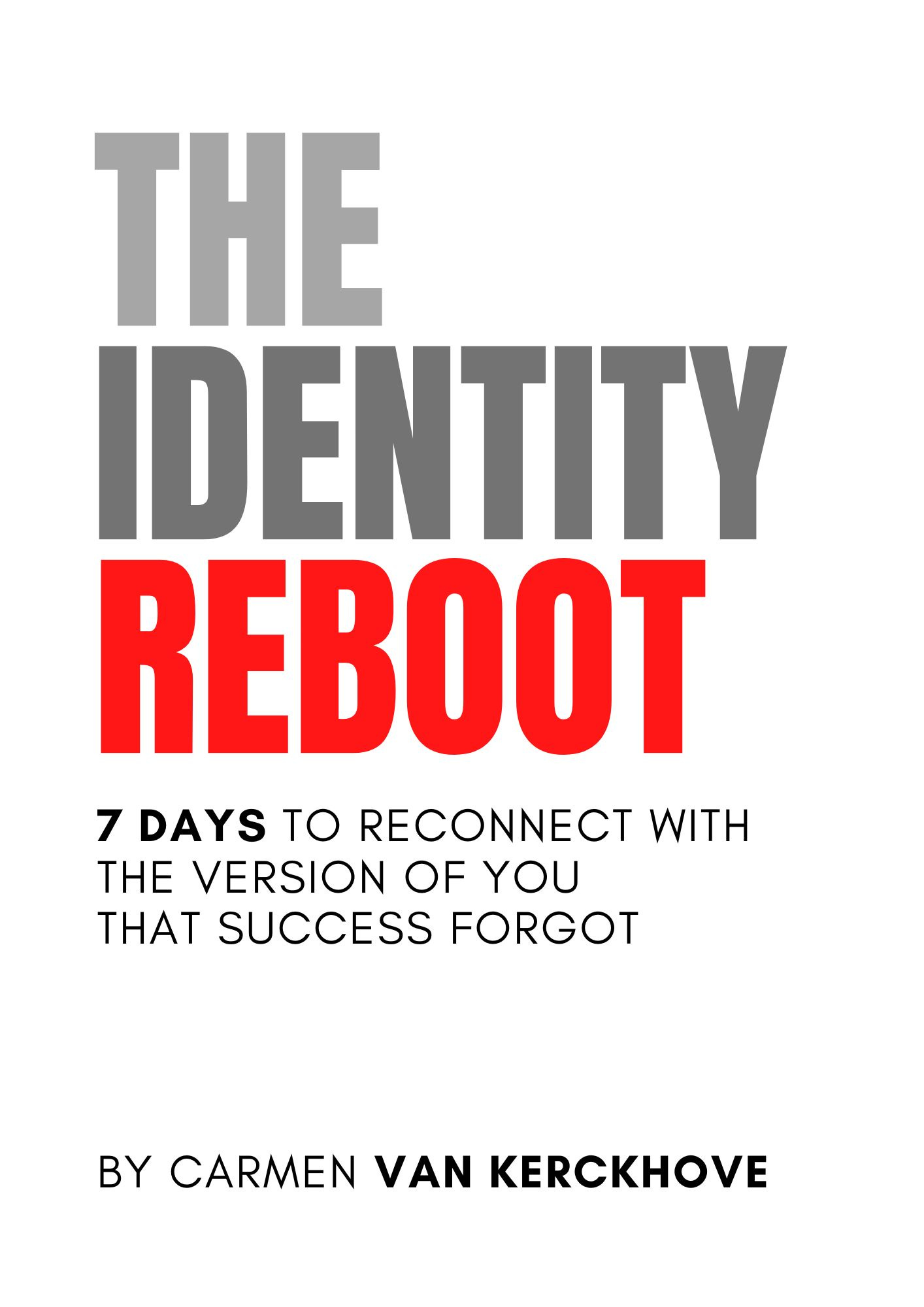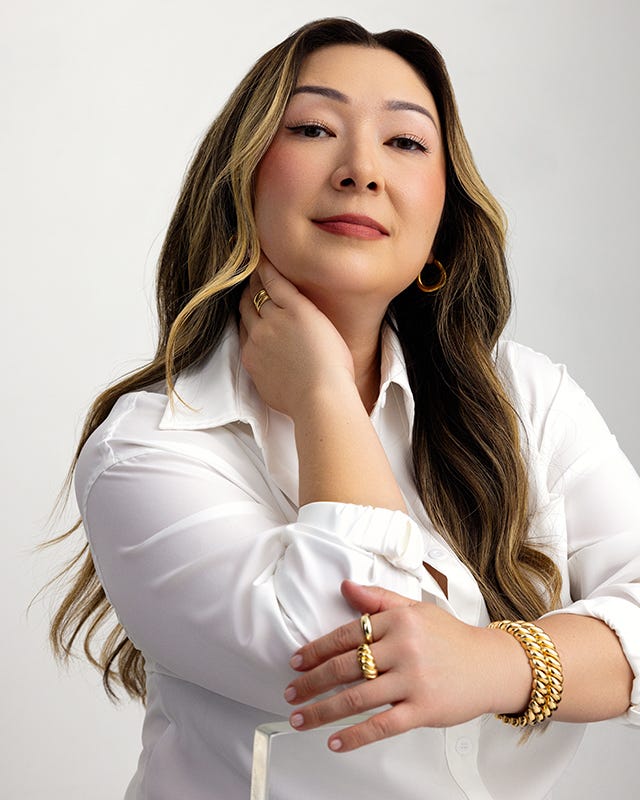Success made me miserable. So I walked away.
What I learned from abandoning two successful platforms—and why I’d do it all over again
The morning I decided to walk away from Racialicious—a blog I had built into an influential platform examining race and pop culture—I sat in front of my laptop with a million conflicting emotions. In one window, I had an email from a literary agent excited about my book proposal. In another window, a request to appear on CNN that weekend. My inbox overflowed with speaking invitations. By every external measure, I'd "made it."
And yet.
I felt nothing but exhaustion and a growing sense that the platform I'd spent years building had become a beautiful cage of my own creation.
This wasn't the first time I would abandon "success" at its peak. Years later, history would repeat itself when I stepped back from Top Flight Family—a luxury family travel platform my family and I had grown to over a million followers across YouTube, Instagram, and TikTok. But the Racialicious story—the one where I traded becoming a sought-after media commentator for running a neighborhood karate school—that's the one that taught me everything about the true cost of success.
When misalignment finds you
Have you ever achieved exactly what you set out to do, only to discover that success feels nothing like you imagined? That the very thing you built has somehow built a wall between you and the life you actually want?
That's the story I want to tell today. Not just about what I walked away from, but what I walked toward—and why the most powerful career moves sometimes look like retreats to everyone else.
Racialicious began, as most passion projects do, from a place of genuine curiosity. As a biracial woman (my mom is Hong Kong Chinese, my dad Belgian) who had grown up mostly in Hong Kong before moving to the US for college, I was fascinated by how differently race operated in America.
In Hong Kong, being mixed race was simply normal. In America, it became my defining characteristic. People would ask, "What are you?" and when I'd explain my background, they'd say, "Oh, so you're really just Asian"—as if half my identity could be neatly erased.
This fascination with how American concepts of racial identity played out in media led to my first blog, Mixed Media Watch, which eventually evolved into Racialicious—a platform examining how race played out in American pop culture. We launched at the perfect moment, just as blogs were exploding as a medium, bypassing traditional gatekeepers and bringing fresh perspectives to conversations that had previously felt stiff and outdated.
The success that followed seemed like validation. I became a regular commentator on NPR, CNN, and MSNBC. The New York Times and Washington Post quoted me regularly. I spoke at universities nationwide, consulted for Fortune 500 companies, and watched literary agents practically line up at my door.
On paper, I was living the dream. In reality? I was drowning.
The hidden cost of "making it"
Here's what my typical day looked like at the height of Racialicious's influence:
Wake up at 6 AM. Review news and emerging stories. Draft quick takes on developing issues. Arrive at my hedge fund executive assistant job by 8 AM. During lunch, sometimes dash to NPR or MSNBC studios for interviews, then back to my desk salad. Leave work at 4 PM, head straight to the karate school my husband and I were building, work there until 10 PM. Return home, finish editing Racialicious posts until midnight or later. Repeat.
Oh, and during the final stretch of this punishing schedule? I was nine months pregnant.
The physical exhaustion was real, but the emotional toll went deeper. Anyone who's done social justice work understands the particular drain that comes from continually engaging with deeply painful issues. But something else was happening that bothered me even more.
I'd become what I later came to think of as an "opinion factory." Whenever race-related news broke—particularly traumatic events like police brutality cases—I was expected to immediately produce a pithy, insightful sound bite. Instead of processing my own grief and shock, I had to package these tragedies into teachable moments for audiences.
At first, I believed I was contributing something valuable. But gradually, I realized I was becoming part of a media ecosystem I deeply disliked—one where commentary had morphed from fostering understanding into pure entertainment. Cable news hosts with the most caustic takes earned the highest ratings. Nuanced conversation was being replaced by performative outrage.
I remember the exact moment clarity struck. I was at a bar with friends watching a political talk show. A commentator—someone I generally agreed with—dismissed everyone on the other side of an issue as not just wrong but stupid and morally bankrupt. The entire bar erupted in cheers and applause. And I thought: I don't want to be part of this anymore.
Every time I appeared on TV to deliver analysis of yet another tragedy, I felt less like I was fostering dialogue and more like I was commodifying trauma. The machine demanded constant content, constant takes, constant performance—and it was grinding me down to nothing.
The courage to step back
After my daughter was born, I tried to make it work. I'd already left my hedge fund job, focusing on Racialicious and helping with our karate school. Literary agents were still calling about book deals. The platform was more influential than ever.
But my heart wasn't in it anymore. I was going through the motions because it seemed like the expected next step. Write the book. Build the brand. Climb higher.
Walking away seemed unthinkable for so many reasons:
First, there was the ego factor. How could I abandon something I'd built from nothing into a prestigious platform?
Then came the moral questioning. Was I selling out? Abandoning an important cause? Putting my selfish needs ahead of a vital mission?
And finally, the status anxiety. Was I really going to trade becoming a sought-after media analyst for running a neighborhood karate school? How would I explain that at alumni events?
These questions tortured me for months. But one realization finally pushed me to make the decision: I'd seen too many "old guard" activists who refused to make space for younger voices. People who clung to their positions long after their passion had faded, preventing fresh energy and ideas from rising. I didn't want to become that person—holding onto a platform out of ego when I no longer had the drive to do the work at the level it deserved.
So I walked away. I passed the reins to my brilliant editor Latoya Peterson (who went on to do amazing things with it) and fully embraced my new life focused on family and our small business.
At the time, everyone thought I was making a huge mistake. In retrospect, it was the best decision I could have made.
The pattern reveals itself
Years later, I found myself in a strikingly similar position with Top Flight Family. I had actually launched this luxury travel platform back in 2016, noticing a gap in the market: plenty of outlets covered family travel but focused almost exclusively on budget options, while luxury travel coverage rarely acknowledged families. But it was during the pandemic, after closing our decade-old martial arts school and switching our daughters to homeschooling, that we decided to go all-in on travel content. We embarked on ambitious projects like visiting 21 resorts in 2021 and 22 cities in 2022.
The success exceeded our wildest expectations. Our YouTube following exploded from a few thousand subscribers to over 100,000. We earned the coveted silver play button. Our TikTok following grew to well over half a million. We were featured on Good Morning America, profiled in major media outlets, and had luxury hotels and tourism boards competing for our attention.
And yet, at our peak, I made the decision to scale back. The travel was incredible, but the toll it was taking was unsustainable. Behind the scenes, I was the one shooting and editing every video, negotiating every brand deal, and organizing each future stay. While my family could rest between trips, I was chained to my laptop, racing to get everything done.
Even more concerning was watching my daughters become recognized by strangers. I didn't want them to end up like the children of mega-influencers I'd seen, unable to take a step through a public place without being swarmed by fans who knew their names, ages, and personal details. I couldn't let my success come at the cost of my children's right to an ordinary childhood.
The pattern had repeated itself: work relentlessly toward a goal, achieve it, discover fundamental misalignments with my values, walk away at the height of success.
With Racialicious, I felt I was becoming part of a media problem rather than a solution. With Top Flight Family, I realized I was building a fame cage around my children that would eventually trap them. In both cases, aspects of success that I couldn't fully anticipate until I was living them conflicted deeply with my core values.
This is the part of success no one talks about. We're sold this narrative that once you "make it," everything falls into place. You'll be fulfilled. You'll be happy. But what happens when you achieve your goal and discover that the very thing you've been chasing is actually pulling you away from the life you want?
The strategic retreat
When you find yourself in this position—when success feels misaligned with your values—you have three options:
Push through the discomfort. Keep climbing higher, hoping the misalignment will resolve itself. (Spoiler: it usually doesn't.)
Pivot within your current path. With Top Flight Family, I didn't abandon content creation entirely—I shifted focus, doing more solo trips and covering broader lifestyle topics. Family travel content now represents less than 20% of what I create.
Step back completely. With Racialicious, I chose to walk away entirely, recognizing that my life circumstances and emotional state required a clean break.
What I've learned through both experiences is that what looks like a step down can actually be a strategic retreat—one that creates space for something greater to emerge.
What seemed like a retreat from my media career was actually creating space for different kinds of impact I couldn't have imagined at the time. Running a neighborhood karate school taught me deep lessons about community building, sustainable business practices, and working with families—all skills that would prove invaluable when I later built Top Flight Family. Stepping back from family travel content created space for this very newsletter and podcast, where I can share deeper insights about creating a meaningful life on your own terms.
What if regret is part of the process?
I'd be lying if I said I never wonder "what if." When I see my peers from the Racialicious days hosting their own cable news shows, leading major media brands, publishing multiple books, or teaching at prestigious universities, a twinge of regret occasionally surfaces.
Where would I be if I'd stayed that course? Would I be a respected professor? A recognized media figure? Author of multiple books?
Here's what I've learned: regret doesn't mean you made the wrong choice. It simply acknowledges that every path has opportunity costs. Every "yes" to one thing is a "no" to countless others. The presence of regret doesn't invalidate the wisdom of your decision—it just means you're human enough to recognize the roads not taken.
What matters isn't the absence of regret but whether the path you chose ultimately aligned more closely with your core values. For me, having the freedom to raise my children away from constant scrutiny, building businesses that serve real communities, and creating content that helps people live more intentionally—these have proven more valuable than the external validation and status I left behind.
When success doesn't fit anymore
If you're feeling trapped in a version of success that doesn't fit, pay attention to that discomfort. It's trying to tell you something important.
Notice where you feel drained rather than energized. Where you're performing rather than living authentically. Where you've outgrown the very thing you worked so hard to achieve.
There's profound courage in recognizing when something that looks impressive from the outside no longer serves you on the inside. Sometimes the boldest career move isn't climbing higher—it's stepping back to reassess your path.
Success that costs you your peace isn't really success at all. The most powerful words in your vocabulary might just be "this isn't working anymore"—not as an admission of failure, but as a recognition that you've evolved beyond your current definition of success.
The greatest successes of my life have come not from clinging tighter to status or recognition, but from being willing to let go at exactly the moment when everyone else thought I should hold on.
If you want to read a more in-depth account of why I stepped away from Top Flight Family, click here for the full story.
Question for you: Have you ever felt trapped by the very thing you worked so hard to build? Have you walked away from an opportunity, career, or project that once felt like a dream—only to realize it no longer fit? Share your experience in the comments 👇
A special thank you gift from me to you:
There’s no paywall on any of my writing. Paid subscribers aren’t paying for access—they’re investing in work that resonates.
As a thank-you, you’ll receive a special gift:
The Identity Reboot:
7 Days to Reconnect with the Version of You That Success Forgot
If your sense of self has gotten tangled up in roles, titles, accomplishments—or the pressure to stay impressive—this guide is for you.
This is your reset.
It’s a 7-day PDF experience designed to strip away everything you’ve outgrown, so you can reconnect with what’s real, true, and still yours.
Inside, you’ll:
Uncover who you are beyond the resume, the job title, or the public performance
Identify which parts of your identity feel authentic—and which feel like armor
Rebuild a vision of yourself that isn’t based on productivity, approval, or prestige
This isn’t about starting from scratch. It’s about remembering who you were before the world told you who to be.
If you’ve ever seen yourself in my writing, this is your next step:
And if now’s not the right time?
I’m still glad you’re here.
Bring Carmen to your next event
Carmen Van Kerckhove is an author and keynote speaker whose work explores how technology, social class, and cultural shifts are reshaping work as we know it. Her upcoming book, The Slingshot Effect (Crown Currency), shows why pulling back isn’t a setback—it’s how every breakthrough begins.
Based in New York City, Carmen speaks at keynotes, conferences, leadership summits, and company retreats.
→ For speaking inquiries, contact info@topflightfamilymedia.com. Explore her signature talks here.







Everything you write is exactly what I need - thank you 🤍
My “career” was exactly what yiu describe. My first job out of college (with a degree in German) was computer programmer in 1962 when computers were off the radar for most people. At various times I was a substitute teacher in every subject and age except boys’ PE. I worked as an expeditor, secretary and chief hostess/coffee girl for a factory. I tutored children aged 6 to16 in math and English grammar. I was assistant manager and accountant for a sheltered workshop. I counseled people whi were unemployed on the subjects of benefits compliance and successful job search. I designed screens for the first online nursing system in Omaha, Nebraska. I was a DBA who traveled full-time nationwide to help set up and customize database systems for universities, government agencies, and manufacturers. And in retirement my husband and I sailed a 45-foot sailboat along the East Coast and from the Gulf of Mexico into the Bahamas. I just never could really decide what I wanted to be so I just tried everything.